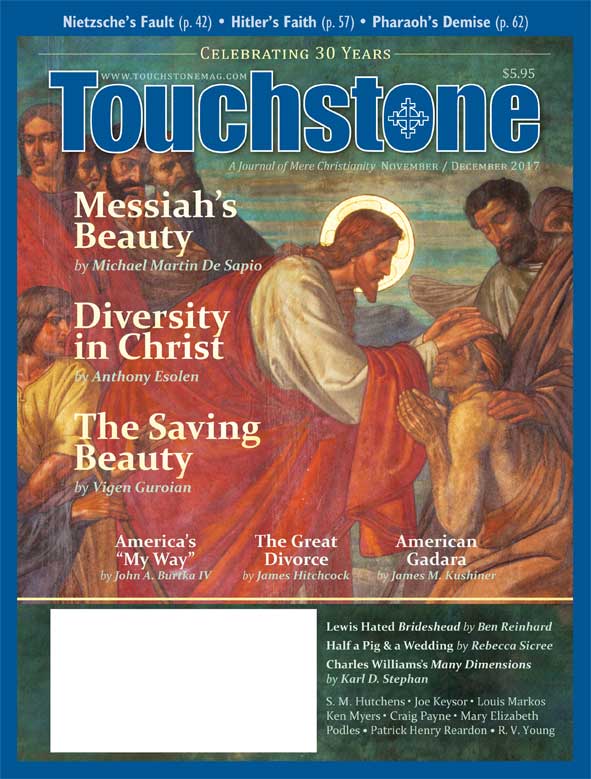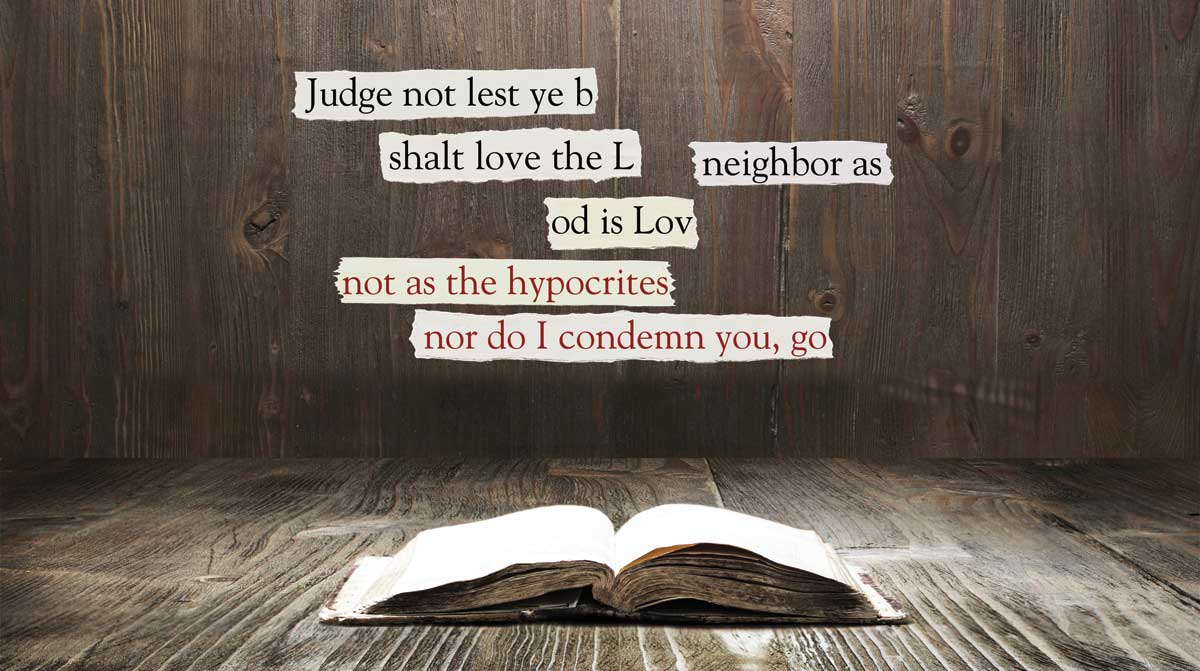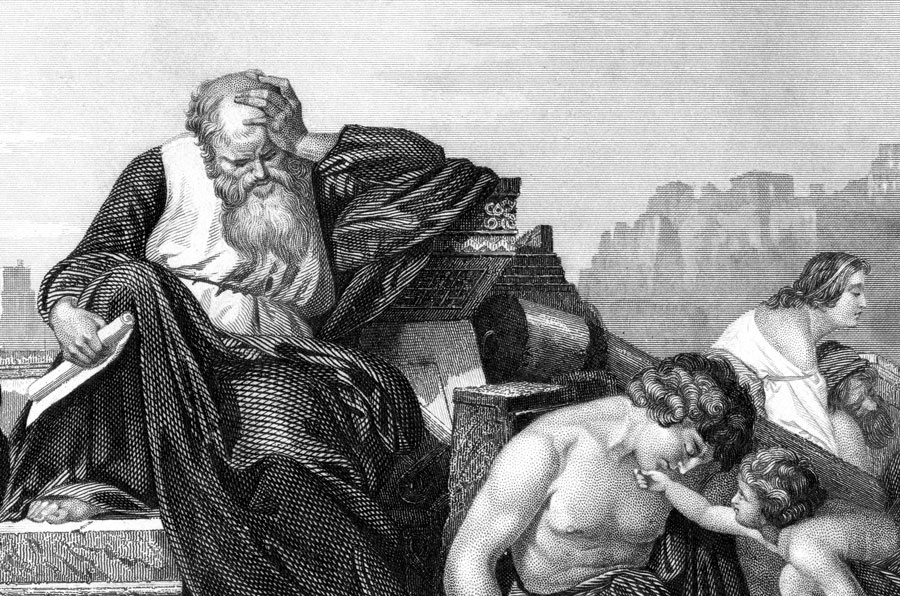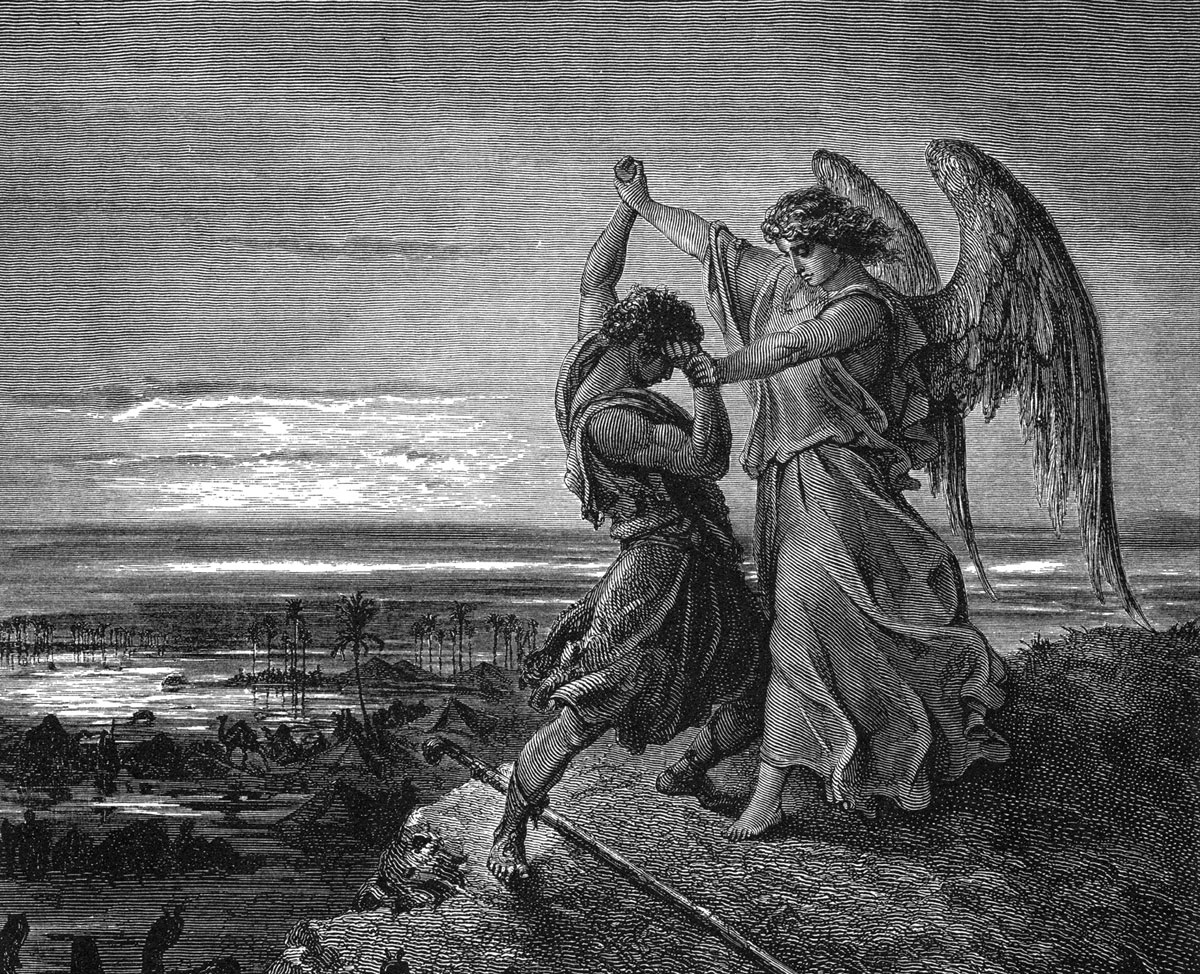Feature
The Greatness Commission
Christ, Individualism & the Meaning of Cultural Diversity
The following is a lecture that I had wanted to give at Providence College, but was warned against doing so by word from one of the deans, who said that a certain group of students would "shut it down." The dean was not displeased by such preemptive censorship.
I am here to speak of cultures in all their splendid diversity, what it may mean to them when they encounter Christ, what that encounter has to teach us about where the value of diversity lies, and how that diversity is threatened by the secular West. But I think it would be most convenient to do first what Plato does in the Republic. That is, I should like to begin not with the great but with the small; not with the society or culture, but with the human person. To do so, I turn to a scene from C. S. Lewis's The Great Divorce.
Imagine an old man sitting upon a stone, looking whimsically upon a traveler who has taken a bus from the gray city below to the bright borderlands above. The traveler gazes with wonder upon a beautiful woman whose robes seem like the expression of her person, so that she is clothed yet fully revealed in her clothing, as if she were Milton's Eve before the Fall, "with native honor clad / In naked majesty." They need no clothes in that country to hide themselves, but rather "the spiritual body lives along each thread." She is followed by a long train of immense beings bearing flowers and dancing, of youths and maidens singing, and of dogs and cats and birds and horses.
"Is it—is it?" the traveler stutters. He believes he is looking upon Mary, the Mother of God.
"Not at all," says the old gentleman with a broad Scottish brogue. "It's someone ye'll never have heard of. Her name on Earth was Sarah Smith and she lived at Golders Green."
The traveler is a bit confused. "She seems to be . . . well, a person of particular importance."
"Aye. She is one of the great ones. Ye have heard that fame in this country and fame on Earth are two quite different things."
Sarah Smith of Golders Green; that is all she was, but the old guide tells us why she is great. "Every young man or boy," he says, "that met her became her son—even if it was only the boy that brought the meat to her back door. Every girl that met her was her daughter." Even the animals partook of her motherly care. Says the old man, "Every beast and bird that came near her had its place in her love. In her they became themselves."
In her they became themselves—that is an astonishing claim. Such is the elevating power of the love of Christ. Says the old man, "It is like when you throw a stone into a pool and the concentric waves spread out farther and farther. Who knows where it will end? Redeemed humanity is still young."
The Diversity of the Saints
In her, in the Lady—for so she is called now, this Sarah Smith of Golders Green, a woman with an ordinary name from an ordinary place—they become themselves, because she is in Christ, and has become herself, has become in Christ the unique and sweetly distinct saint that she was meant to be. Let us think about this for a moment. How diverse and magnificent are the saints of God! There is the young priest John Bosco, walking a tightrope and doing magic tricks to attract the street boys of Turin. There is the barrel-chested Thomas Aquinas, the so-called Dumb Ox, who spent his years as a student at the university listening and thinking, listening and thinking, but now, a friar at the court of King Louis IX, seated at table among the chattering lords and ladies, he suddenly bangs his fist and cries, "Thus are the Manicheans refuted!"—at which the king, a saint of God himself, calls a pageboy over and asks him to bring pen and parchment to Brother Thomas.
There is the diminutive nun from Albania, her face creased with long years of hardship, but also creased with the smiles she bestowed upon the refuse of Calcutta. See her kneeling in a ditch to clean the pus-oozing sores of a dying man. "I wouldn't do that for a million dollars," says a reporter, choking from the stench. "I wouldn't either," replies Mother Teresa.
See the impetuous Peter, half out of his senses on the top of Mount Tabor, crying out to the transfigured Jesus, "Lord, it is good for us to be here!" And see the same bold man on that dreadful night of betrayal, slinking about the praetorium, and protesting that he never knew Jesus at all; then leaving the precincts when the cock crows, to weep bitter tears. See the essential mother Monica, following her beloved son over the sea to Rome; and see that son, fairly thrust into the faith against all his earthly passions, write the first tribute for an ordinary and probably illiterate woman that we know of in the history of the world.
They are St. Anthony of Egypt, well over the age of one hundred, and the newly canonized St. Jose Luis Sanchez del Rio, a fourteen-year-old Mexican boy and a member of the Cristeros, who refused to deny Jesus when he was captured by the secular government's army. They slashed the soles of the boy's feet with a machete, they tortured him physically and psychologically, they took him to the killing ground and punctured him with bayonet thrusts, and they offered to spare his life if he would only cry out, "Death to Christ the King!" But "Viva Cristo Rey!" he cried, and the infuriated captain shot him in the head with his pistol.
They are men and women, old and young, learned and unlettered, kings and doorkeepers, husbands and wives, priests and nuns, soldiers and farmers, painters and sailors; people like Paul, whose very words were on fire; and people like Margaret Mary Alacoque, permeated with the sweet mercy of Jesus. What strikes me as I think of the saints is how sharply distinct they are, how themselves they are, as if each one were a unique coin fresh-minted; some shining with luster like a blaze, others with a pleasing glow; for holiness alone can really bring us together in and through the very differences that holiness cleanses and sharpens and makes beautiful.
The Sameness of the Wicked
Dante makes the point quite forcefully, again and again, in the Paradiso. So says the soul of the Emperor Justinian, in the context of explaining why it is a joy for him to be granted the second-to-lowest rung of heavenly bliss:
Diversi voci fanno dolci note;
cosi diversi scanni in nostra vita
rendon dolce armonia tra queste rote.Diverse voices make the sweeter song;
here in our life the diverse thrones endow
the wheels of heaven with sweet harmony.
We see it also in the exquisite care with which Fra Angelico, in his Last Judgment, paints the countenances of the saints as they look with wonder upon Christ in glory, or greet one another with a holy kiss. No two are alike; it is as if the good painter dwelt upon each one, asking himself what was the most prominent gift of God that shone through each life.
Consider the converse. There are plenty of sharply defined but ruined individuals in Dante's Inferno; but the farther we descend into that funnel of futility, the more do we see people reduced, flattened, defined not by one gift of God but by one ruling passion or relentless habit; and many of them are submerged beneath individuality itself. So are the misers and the spendthrifts in the circle of avarice. When Dante remarks to Virgil that he thinks he might recognize a few of the people who got themselves dirty in that sin, Virgil replies,
"Forget it, it's an empty thought.
The nothing-knowing life they lived on earth
dims them beneath all recognition now."
So also the sullen submerged in the black bog of the River Styx; the usurers sitting on the burning sands, identifiable only by the insignias of their money pouches slung round their necks; and the worst of the traitors, wholly encased in ice. We might put it this way: it is hard to tell one person from another when all are fouled with mud. So everyone in an angry crowd shows the same face contorted in wrath; so those who are in the grip of lust no longer even dwell upon the human face, but upon mere parts of the body, as if there were no name in the world at all.
The Diversity of Creation
It is an insight close to the hearts of the Christian poets. I think here of Gerard Manley Hopkins, the priest-poet with an eye for the wild diversity of God's creation—not sameness everywhere, and generality, but distinct and beautiful things, particular things, good in themselves:
Glory be to God for dappled things,
For skies of couple-color as a brinded cow,
For rose-moles all in stipple upon trout that swim;
Fresh fire-coal chestnut-falls, finches' wings,
Landscape plotted and pieced, fold, fallow, and plow,
And all trades, their gear and tackle and trim.All things counter, original, spare, strange,
Whatever is fickle, freckled (who knows how?)
With swift, slow, sweet, sour, adazzle, dim;
He fathers-forth whose beauty is past change:
Praise Him.
Hopkins could write in his notebook about the glory he could find in a little stand of bluebells, or in the northern lights, for, as he writes in another poem,
Each mortal thing does one thing and the same:
Deals out that being indoors each one dwells;
Selves—goes itself; myself it speaks and spells,
Crying What I do is me: for that I came.
If that wisdom applies to kingfishers, dragonflies, and stones you tumble in a well, so does it apply to mankind. But man is more: in the Christian vision, he becomes himself and more than himself by taking on Christ. He
Acts in God's eye what in God's eye he is—
Christ—for Christ plays in ten thousand places,
Lovely in limbs, and lovely in eyes not his
To the Father through the features of men's faces.
That is indeed what the Christian believes. It is a paradox, well expressed by St. Paul, who said, "It is not I, but Christ who lives in me," and yet the Christ who plays to the Father through the features of that unique and irascible saint from Tarsus makes him more, not less, of what he is as Paul, so that as Paul he can claim, as he looks forward to his execution drawing near, "I have fought the good fight, I have run the race to the finish, and now there is laid up for me an everlasting crown of glory."
The Error of Individualism
G. K. Chesterton famously said that the world was full of Christian ideas gone mad. Such I believe is the Christian insight into the uniqueness of the saint, which in the secular West has degenerated into the cult of the individual. It is interesting to note that the very word "individual" did not originally refer to single persons. We find it, for example, in Milton, when Adam calls to Eve, newly created:
Return, fair Eve!
Whom fliest thou? Whom thou fliest, of him thou art,
His flesh, his bone; to give thee being I lent
Out of my side to thee, nearest the heart,
Substantial life, to have thee by my side
Henceforth an individual solace dear.
Individual: indivisible, never to be parted; which Milton here uses to affirm the bond of marriage, or as Spenser had put it, to knit the knot that ever shall remain.
But slowly into the West trickled the error of individualism—whether it began with Duns Scotus and the Franciscans, or the brilliant solipsist Descartes, or Machiavelli, who lent to Satan himself the name "Old Nick," it does not matter here. The point is that Western man fell prey to a false anthropology, which was also a false theology. This individualism shows up in a variety of forms, depending upon economic conditions and cultural and even religious movements. In Victorian England, we have the ideal of the man cut free from traditions, who re-evaluates all things according to his best lights: such is the "liberty" of John Stuart Mill. Charles Dickens, who was no systematic thinker but who saw more deeply than Mill the human consequences of such a vision of man, gives us such admirable individualists as the miser Ebenezer Scrooge, eating bad leftover gruel alone in his dismal flat on Christmas Eve, or the fraud Josiah Bounderby, supposedly self-made, master of the belching smokestacks of Coketown. Dickens would have agreed with his fellow Victorian George MacDonald—the good Scottish guide in The Great Divorce—that Satan utters forever the most terrible of lies, "I am my own, I am my own."
In America, if you say, "I am my own man," you are praising and not accusing yourself. You may be the mythical pioneer, staking out a homestead in the plains with nothing but some sacks of grain and dried meat and coffee. You may be the mythical businessman praised by Horatio Alger, who begins as a paperboy and through hard work and the more self-serving virtues climbs to be a mogul of the news, a William Randolph Hearst.
In more recent years, the cult of the individual has gone from the muscular to the sensuous, and from the sensuous to the self-decorating and self-mutilating. So we have people who do with sex what the early individualists did with property and money: they acknowledge no moral laws but those that serve their turn, and define their very selves by their preferred forms of sexual business. Thus there is a clear parallel to draw between laissez-faire and laissez-coucher: between the man who affirms a complete individualism over his wallet, and the man who affirms a complete individualism over the items several inches away.
Any such individualism is at odds with the nature of both God and man as revealed in sacred Scripture. Even before the New Testament's revelation of the three-personed God, Father, Son, and Holy Spirit, we see in the Old Testament a God of relationships. He is not what Chesterton called "the lonely God of Omar," and to meditate lovingly upon his laws, as the psalmist does, is not at all like the flight of the gentle mystic Plotinus as he contemplates the One: the "flight of the alone to the Alone." He is of course the only God, the great I AM; but his name is also the God of Abraham, the God of Isaac, and the God of Jacob. We can put these two names together thus: the fullness of being is not being apart, being oneself alone, but being for; and that is most concisely revealed by the potent declaration of St. John, not that God happens to love, or even that love is the most important feature of God, but that God himself, in himself, even if he had never created this stupendous universe we live in, God himself is Love.
Love & the Polis
Here the door opens for us to go from discussing the person to discussing the culture. Plato and Aristotle shared the Greek sense that the man who set himself apart from his fellow men, as if his personal affairs were his only concern, was like the Cyclopes in Homer's Odyssey, who live in their own caves, who never meet to discuss the common good, and who ignore their neighbors. The Greek term for such a person—we can call him an individualist if he raises that Cyclopean behavior to be the rule of his life—is idiotes, an idiot, wrapped up in himself. We need one another, the philosophers saw, and we flourish best when we live in society, because no one of us can provide for his own needs beyond the level of a brute subsistence. When we come together, we can unite our work toward the realization of something greater than ourselves: the polis, with its shining temples, its festal games and processions, and its public conversations about the good, and the true, and the beautiful.
Each philosopher in his own way perceived dimly that love had something to do with the polis, but each was also hindered by the supposition that love involved a lack or a need: you love what you do not have. So we find in Plato's Republic a suppression of the individual for the benefit of the polis, even though in the Phaedrus it appears that the lover enjoys an exaltation of his person when he gazes upon the beauty of the beloved. But if love flows forth from a fullness of being, and if the human person is not only raised by love, but can only be said to become truly himself when he gives himself away in love, then it is not true that we come together merely for the sake of goods which each of us cannot supply for his family on his own.
Human beings are meant to be the individual persons they are by giving themselves away and not insisting upon their individuality—as men and women gain the inestimable liberty of marriage by binding themselves to one another forever, and choosing to throw away their freedom of choice, bravely and gallantly, as if they should cut anchor and sail the open seas. The saints are sharply individual because they set out not to be individuals at all, but to love in the ways they were given to love—and to love not in the abstract, but in the concrete; to love not mankind, but the neighbor. So we can say that St. Francis did not kiss leprosy or leper-hood, but a leper: that particular suffering man whom he met on the road to Assisi.
Then the Church, as the herald of the good news of Jesus Christ, does not encounter culture in the abstract, just as she does not address mankind in the abstract. She encounters particular cultures in their particular modes of life: the way they eat and drink, where they live, how they marry, what virtues they esteem, what songs they sing, and what deities they honor. She does not subject those cultures to a plan for homogenization and amalgamation into the Church. It is as Hans Urs von Balthasar puts it, that "the covenant of God with humanity has nothing of the character of liberal reason which excludes by abstraction and then discusses the concrete."
Woodrow Wilson wanted to make democracies of all nations, and so he excluded by abstraction all cultural forms that did not fit the democratic mold. He was in fact hardly thinking of cultures at all; it was his "liberal reason" that prevented him from appreciating the many-cultured splendor of the Austro-Hungarian Empire he was determined to dismantle. But Jesus does not say, "Go and turn all nations into democracies." He says, "Go make disciples of all nations, baptizing them in the name of the Father, the Son, and the Holy Spirit." We must assume that the nations remain the nations, just as when St. Peter is brought to Cornelius the Roman centurion (Acts 10), Cornelius remains a Roman and a centurion, and is perhaps more truly Roman than ever: for God never calls us en masse, like ants in an anthill, but by name, each one.
To Purify the Cultures
That has been the wisdom of the missionaries from the beginning. It can only have been inspired by the Holy Spirit, since human beings alone, when Christ is not ever before their eyes, are apt to think rather of conquest and obliteration or of absorption of the local into the imperial. When Augustine the bishop of Canterbury wrote from England to Pope Gregory the Great, asking him what he should do with the pagan shrines, Gregory did not advise him to destroy them. He told Augustine that the shrines should be preserved and purified. When you purify metal, you burn away the dross, so that silver refined is more silver than it was in its adulterated condition. To purify in this sense is to make something more genuinely itself than it had been, not less.
We see this purifying, for example, in the encounter of the Christian faith with the Germanic warrior code as found in Beowulf. The poem was composed by a Christian monk meditating upon the fairly recent paganism of his own people and the still vigorous paganism of Germanic peoples across the North Sea. The poet treasures that old warrior code, and honors those who lived well by it, but he sees that it was insufficient—first because men are sinners, and even when their culture commands them to be loyal to their lords and benefactors, greed or arrogance or vindictiveness or simple fear for their lives will get the better of them; and second because that code could not come near to addressing the aim of human existence.
Beowulf could slay Grendel, but he could not save Heorot from ruin, because Grendel does not dwell only in that dismal lake; Grendel has his lair within every human heart. The battleground is not outside of us. It is within. Heorot would be destroyed by treachery, an evil that you cannot fight with the strength of thirty men in your fist, such as Beowulf possesses.
The poet sees that the answer to his own culture's longings cannot come from within the culture itself, but must come from without, through Christ; but that does not mean that the culture ceases to be. Far from it: for the poet himself is writing a heroic poem in the heroic style of his ancestors, on matters that his listeners would have known about, historical events such as the massacre at Finnsburh, and Hygelac's disastrous raid against Frisia. We can say that he wants his people not to be less loyal to their lords on earth and their Lord in heaven, but more; he can say as the bold St. Paul says to the Corinthians, "Acquit yourselves like men!"
So, too, the anonymous poet of The Dream of the Rood does not say that man should be less interested in treasure, but more: as in his dream he sees the blood of Christ on the cross sometimes as blood and sometimes as precious and shimmering jewels. So St. Boniface went among the tree-worshiping Germans, not ridiculing them for their worship, but advising them as to where the Tree of Life really stood: upon a bald hill called Calvary.
It has always been so. Matteo Ricci spent ten years in excruciating study, learning Chinese and poring over the philosophies of Confucius and Mencius and all the other sages, essentially becoming a mandarin to preach to mandarins, even to enter the Forbidden City as a guest of the emperor. The history of the world might have been utterly different, had communication between Father Ricci and Rome not been so slow, and had his way of seeing in the Chinese a natural and cultural openness to the Trinity not been subjected to the scruples of the more cautious Dominicans, the rivals of his Jesuit order.
Distinguishing the Grammar from the Sap
C. S. Lewis has exactly this diversity in mind when he asserts, in that just as union with God and communion in the Church bring about an exaltation of personality, so also do they exalt the "personality" of a nation, its cultural particularity, its being itself. The faith is the enemy of homogenization:
If one is thinking simply of goodness in the abstract, one soon reaches the fatal idea of something standardized—some common kind of life to which all nations ought to progress. Of course, there are universal rules to which all goodness must conform. But that's only the grammar of virtue. It's not there that the sap is. [God] doesn't make two blades of grass the same: how much less two saints, two nations, two angels. The whole work of healing [the earth] depends on nursing that little spark, on incarnating that ghost, which is still alive in every people, and different in each. When Logres [the mythical realm of King Arthur] really dominates Britain, when the goddess Reason, the divine clearness, is really enthroned in France, when the order of Heaven is really followed in China—why, then it will be spring.
Just as God blesses the world with all things counter, original, spare, strange, and with men and women who reflect Christ in unique and unrepeatable ways, playing to the Father through the feature's of men's faces, so, in Lewis's vision, the universality of the Church is mediated through unique and uniquely blessed nations, a diversity of cultures and therefore of ways in which to embody on earth a reflection of the City of God on high. The moral laws, according to Lewis, are like a scaffolding for a building, or like the skeletal grammar of a language; but what you build, and what you say, or rather how you sing in mirth with one another and in devotion to God, will be blessedly different from nation to nation, and each nation's genius will be a precious gift to all the others.
And so each culture has the potential to embody a "word" that God speaks to its people, and through them to the rest of the world. This remains true regardless of whether or not the culture has passed away, so long as the culture still testifies to us through its wisdom and its art. Indeed, it may be easier for us to glean what is pure and wholesome and true from the cultures of the past. We can more easily see and appreciate the soaring spirituality of medieval France in the great jewelry box called Chartres Cathedral, or the humane austerities of the Puritan colony at Plymouth, and forgive the Frenchmen for drinking too much, and the Puritans for drinking too little. To suggest that a culture should no longer be loved because it no longer dwells upon the earth is to consign human existence to amnesia. It is to shut a man's mouth with the earth of the grave.
False & True Missionaries
If individualism of the left or right is what you get when you forget that each human being is made in the image of God who is love, what happens when you forget what the Church is and what a genuine human culture looks like? I believe that the last hundred years are full of examples of what you get. The collective is a false communion that does not raise human individuality but flattens it. Consider the difference between what Father Ricci did to prepare for preaching to the Chinese mandarins, and what Mao Tse-Tung, his mind taken wholly not by the Christian faith but by ideology, did to his own people in the so-called Cultural Revolution. China had been home to a broad variety of local cultures, with their ancient ways and traditional gods, but Mao ran them all flat with his ideological directives backed up by tanks and bombs and guns. He slew sixty million people, and who knows how many cultural "words" were lost forever.
Jesus commands the Church to go forth and preach the good news to the world. Modern ideologies, mimicking the universality of the Church, evince a totalitarian impulse, an impatience with what is small and local and particular, aiming to subject it to the abstractions of a desiccated secular reason. The secular West bids fair to be the worst of all missionaries, a missionary with a lot of money and food and medicine, but no faith. Father Junipero Serra taught the Indians of southern California how to grow the olive and the grape, how to build mills for grain, how to dig wells and build permanent dwellings of clay and stone. He brought these gifts and he brought the faith, which is also a gift. But the secular West brings goods on condition that the people who need food and medicine will accept the secular Western nihilism as regards sex, marriage, and family. Corrupt yourselves, or starve.
Secular man in the West has a thin notion of culture. He is dominated not by memories of heroes and saints, but by mass media, mass education, mass entertainment, and mass politics. Not understanding the power of culture, he is oblivious to the human destruction he causes when he attempts to reduce all peoples to his own rootlessness and alienation from the nature of the world and even of his own body. His longing for communion has not vanished, nor has his orientation towards sainthood; those are essential to his God-ordained nature. But just as he turns toward the fads of the mass phenomena to define himself—to tattoo himself with a label, sexual or racial or ideological, because his sense of his own individuality is so precarious—so does he turn to political parties and other false communions to fill his need to belong to something, to give himself utterly.
The modern missionary to the West—whether he is my friend the priest from Nigeria, now saying Mass to the sons of France in Canada, or one of my many American students who have graduated from Providence College and are now preaching in the United States—meets something new in the history of the world. He confronts people who have accepted, with the air they breathe, the ideal of being true to themselves, or making themselves, inevitably after patterns provided by mass entertainment, and who have no more cultural soil beneath their feet than suffices to bring up the occasional memory of Washington, a verse or two from Scripture, and some truisms regarding Shakespeare or Michelangelo, invariably political and usually false. It is ironic but unsurprising that at this very time, we talk about multiculturalism when the thing itself, culture, is rapidly withering upon the earth.
The church of Christ, then, must be radical indeed: she must pierce to the root. Her duty now is not in the first instance to make bad men good, but to make half-men whole; not to turn communities toward the Lord, but to introduce half-citizens to the very idea of community; not to evangelize a culture, but to till the moral and aesthetic soil so that a culture of any sort can grow in the first place.
The Professor's Role
I will conclude with what I believe must be our role at Providence College as Catholic professors of the liberal arts. Our students speak English, nearly all of them as their native tongue. Yet they know almost nothing of the poetry of that language; most of my freshmen do not even recognize the names of such brilliant poets as Milton and Tennyson. Our students live in the United States, yet they are vague about its history, and know almost nothing of the cultures that bequeathed to us our political and social institutions. Our students who speak Spanish have never heard of Calderon or Murillo or Luis de Victoria. Most of our students are Christians of some sort, yet the names of the great patristic theologians are as foreign to almost all of them as are the names of the mountains on the moon.
Our schools have failed them. The last four centuries have brought to mankind urgent questions regarding the relationship between faith and reason, the distinction between the human person and the beasts, the power and the limitations of the natural sciences, the nature and the source of what everyone the world over calls "human rights." We want very much to usher our students into these discussions; and so we introduce them to such thinkers as Thomas Aquinas, Machiavelli, Pascal, Kant, and John Paul II.
We want also to introduce them to things that we hope will be an antidote to the poison of a debased mass entertainment: to great poetry and art and music and works of human thought. These are as far from them as the stars, and yet they are theirs, too. Goethe and Titian and Bach and Kierkegaard are a part of the particular world they happen to live in, as Ramunaja is near the heart of India and Hokusai near the heart of Japan. And with Titian and Bach and the rest, we who have spent our lives in their shadows have half a chance—and it is only half a chance—of enticing them to look beyond their temporal and personal concerns, towards the permanent things, and towards him who is their source, the God of all nations, the immortal, invisible, and only-wise Father.
Anthony Esolen is Distinguished Professor of Humanities at Thales College and the author of over 30 books, including Real Music: A Guide to the Timeless Hymns of the Church (Tan, with a CD), Out of the Ashes: Rebuilding American Culture (Regnery), and The Hundredfold: Songs for the Lord (Ignatius). He has also translated Dante’s Divine Comedy (Random House) and, with his wife Debra, publishes the web magazine Word and Song (anthonyesolen.substack.com). He is a senior editor of Touchstone.
subscription options
Order
Print/Online Subscription

Get six issues (one year) of Touchstone PLUS full online access including pdf downloads for only $39.95. That's only $3.34 per month!
Order
Online Only
Subscription

Get a one-year full-access subscription to the Touchstone online archives for only $19.95. That's only $1.66 per month!
bulk subscriptions
Order Touchstone subscriptions in bulk and save $10 per sub! Each subscription includes 6 issues of Touchstone plus full online access to touchstonemag.com—including archives, videos, and pdf downloads of recent issues for only $29.95 each! Great for churches or study groups.
Transactions will be processed on a secure server.
more on culture from the online archives
more from the online archives
calling all readers
Please Donate
"There are magazines worth reading but few worth saving . . . Touchstone is just such a magazine."
—Alice von Hildebrand
"Here we do not concede one square millimeter of territory to falsehood, folly, contemporary sentimentality, or fashion. We speak the truth, and let God be our judge. . . . Touchstone is the one committedly Christian conservative journal."
—Anthony Esolen, Touchstone senior editor













